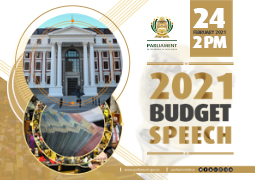
The Minister of Finance, Mr Tito Mboweni, will table the Division of Revenue and the Appropriations Bills, among other instruments, in his Budget Speech tomorrow in the National Assembly (NA), to provide for the equitable division of revenue raised nationally among the three spheres of government and to authorise the expenditure of government funds.
The speech is going to be delivered in the NA as the rules of Parliament call for the introduction of legislation in a House and not in a Joint Sitting as joint sittings of Parliament are not for the processing of legislation. Furthermore, the Minister is a Member of the NA.
According to the Constitution of the Republic of South Africa, any amendments to the fiscal framework that impact on the Division of Revenue Act will require a Division of Revenue Amendment Bill to address disparities between the spheres of government’s responsibilities and fiscal regimes that give rise to significant fiscal imbalances due to old, persistent budgetary challenges or new emerging socio-economic needs.
These fiscal imbalances stem from competing socio-economic responsibilities and the increasing burden that our contracting national budget has to negotiate. This is made even worse by the pressing need to dedicate financial resources to arrest the spread of Covid-19.
Constitutionally, the national government is charged with certain portfolios such as foreign affairs, defence, police, higher education and to make policies and set priorities through legislation.
The provincial governments’ task is to deliver school education, health, social welfare and to give effect to national priorities. The local government is the one at the coalface of service delivery. Among other things, it is responsible for the delivery of water, sanitation, refuse removal and has more autonomy on how its resources are spent in pursuit of these duties.
Each sphere of government has its own stream of revenue meant to address its responsibilities as stated above. For instance, the national government’s main revenue comes from income tax, value added tax, and customs duties. The province’s main revenue comes from vehicle licences, hospital charges and gambling taxes. While the local government’s revenue comes from property rates and surcharges on service fees.
Every year, adjustments have to be made to address the budgetary shortfall arising from the inadequacies of national, provincial and local revenue streams. This will definitely be exacerbated by the financial burden brought about by the coronavirus pandemic.
In response to that, the Constitution proclaims that an Act of Parliament must provide for the equitable division of revenue raised nationally among the national, provincial and local spheres of government to deal with revenue shortfalls.
The Division of Revenue Act and the Division of Revenue Amendment Bill are instruments through which the National Treasury addresses this constitutional entitlement. But these provisions must be made in respect of the national debt and other national obligations, in accordance with the needs and interests of the national government as determined by the criteria of its objectives. This must be done in a manner that will ensure that the provinces and municipalities are able to provide basic services and perform the functions allocated to them.
The Division of Revenue Bill is an outcome of an extensive consultation of structures that include the budget councils and the budget forums of the national departments, Cabinet, provincial premiers and the Chairperson of the South African Local Government Association (Salga), to determine if are there any clauses that have become redundant, are there new developments that necessitate special and new provisions, and are there gaps that have been identified in implementing the Act?
Also, when the budget is tabled, a report must also be tabled that responds to the recommendations made by the parliamentary committees on appropriations regarding the proposed division of revenue and conditional grant allocations to provinces and local governments, as contained in the Medium Term Budget Policy Statement.
By Abel Mputing
23 February 2021

